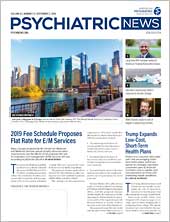FDA Releases Guidance on OUD Medications
The FDA in August issued new recommendations aimed at encouraging more robust development of novel medications to assist in the treatment of opioid use disorder (OUD).
Clinical trials evaluating the effectiveness of medication-assisted treatment for the purposes of FDA approval have to date generally used reduction in drug use as an endpoint. The new draft guidance outlines additional ways for drug developers to measure clinical outcomes demonstrating a drug’s effectiveness; these include endpoints centered around adverse outcomes including overdose mortality/overall mortality, the frequency of emergency medical interventions, or acquisition of injection-related infections. Other potential outcomes include real-world improvements such as the ability to resume work or school.
“[T]he agency recognizes that evaluating [these outcomes] could require larger trials than those usually conducted for marketing approval. To that end, the FDA is encouraging sponsors to discuss their plans with the agency early in the drug development process,” the agency said in a statement. “The agency is also committed to providing assistance to sponsors interested in developing a validated measurement of patient-reported experiences, such as ‘craving’ or ‘urge to use’ opioids, which make it difficult for patients with OUD to sustain recovery.”
Risperidone LAI Receives FDA Approval
Perseris, a once-monthly form of risperidone, has been approved by the FDA for the treatment of schizophrenia in adults. Perseris uses an extended-release delivery system that allows patients to achieve clinically relevant levels of the drug after the first injection without the need for a loading dose or supplemental oral risperidone.
According to Indivior, the manufacturer of Perseris, the efficacy of this long-acting injectable was demonstrated in a phase 3 randomized, double-blind, placebo-controlled, eight-week study of 354 patients with schizophrenia. The study found a statistically significant improvement in the primary clinical endpoint (Positive and Negative Syndrome Scale total score) at the end of the trial. The improvement in Clinical Global Impression Severity of Illness (CGI-S) was also statistically significant at the end of the trial.
The safety profile of Perseris was consistent with that of oral risperidone. The most common systemic adverse reactions in the phase 3 trial were increased weight, sedation/somnolence, and musculoskeletal pain. Prescribing information including a boxed warning can be accessed
here.
Sandoz Issues Recall of 470K Blister Packs
In July, Sandoz, a division of Novartis Pharmaceuticals, implemented a voluntary recall of over 470,000 blister packages of medications after discovering that some blister packs did not meet U.S. child-resistant packaging requirements.
Twelve medications were affected by the defective packages, including the psychiatric medications donepezil, haloperidol, imipramine, perphenazine, and risperidone. Consumers should immediately secure their blister packs out of the sight and reach of children, and contact Sandoz to request a resealable, child-resistant pouch.
The company said that there are no safety or quality issues with the medications themselves, and any tablets of these medications provided in bottles are not affected by the recall. A full list of affected packages including lot numbers can be accessed
here.
Phase 3 Trial of Cyclobenzaprine for PTSD Halted
Tonix Pharmaceuticals announced in late July that it is halting its phase 3 study of Tonmya (cyclobenzaprine HCl sublingual tablets) as a treatment for military-related posttraumatic stress disorder (PTSD). After 12 weeks, participants taking Tonmya (5.6 mg at nighttime) did not show any statistical improvements in their PTSD symptoms compared with people taking placebo. PTSD symptoms were measured by the Clinician-Administered PTSD Scale for DSM-5 (CAPS-5).
While Tonmya did not achieve its primary endpoint, the company noted that the people taking Tonmya did show significant improvements over placebo in both CAPS-5 and Clinical Global Impression–Improvement scores after four weeks. ■
